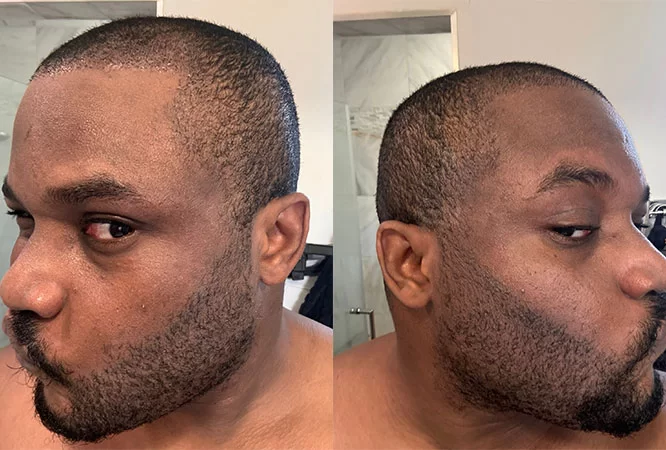Beard and Mustache Transplant
- Home Page
- Beard and Mustache Transplant

Beard and mustache transplants have become increasingly popular in recent years. While the procedure is similar to hair transplants using the DHI technique, many people opt for it for various aesthetic reasons. Sparse beard and mustache hair can be addressed by transplanting hair follicles to specific areas, making the results nearly indistinguishable from the surrounding hair when performed by an experienced specialist.
reasons for beard and mustache transplants
- Sparse Hair: Many individuals experience thinning hair in their beard or mustache.
- Scars and Burns: Scarring from injuries or surgeries can affect facial hair growth.
- Hormonal Disorders: Conditions such as hormonal imbalances or metabolic diseases may lead to hair loss in facial areas.
It is generally recommended to wait until the age of 22 for a hair transplant operation.
donor areas
The donor area for beard and mustache transplants is usually the back of the neck. In some cases, body hair may also be used. The DHI method is employed for collecting and transplanting grafts, typically requiring around 3,000 hair follicles for a beard and 400-800 for a mustache.
beard transplant
causes of beard loss
- Genetics: Many people have a genetic predisposition to beard loss.
- Hormonal Issues: Hormonal deficiencies can hinder hair follicle development.
procedure
The FUE method involves collecting hair follicles from the donor area and placing them into the target area at a natural angle. Typically, 1,000 to 3,000 roots are planted to achieve the desired appearance. Patients experience no pain due to local anesthesia, and the use of micro punches minimizes scarring.
before and after care
Before the Transplant:
- Anesthesia Options:
- General Anesthesia: Complete unconsciousness.
- Regional Anesthesia: Patient is conscious but numbed in the target area.
- Local Anesthesia: Numbing at the specific site of the procedure.
After the Transplant:
- You can wash your face 24-48 hours post-op.
- Expect some redness and slight irritation in the transplant area, which should subside within a week.
- Shock loss may occur around two weeks after the procedure, but hair will start to grow back within 4-8 months.
beard transplant cost
The cost of a beard transplant varies based on several factors:
- Number of grafts needed.
- Technique used.
- Experience of the doctor.
- Clinic location.
beard transplant in turkey
Turkey is known for its experienced surgeons and advanced techniques in beard transplantation, making it an attractive destination for those seeking the procedure at competitive prices.
mustache transplant
A mustache is an important aesthetic feature that influences facial expression. Many men seek mustache transplants for various reasons, including scarring or hormonal issues.
procedure
The DHI method is the preferred choice for mustache transplants. Careful attention to the angle of hair growth is essential for achieving a natural appearance.
Donor Areas: Typically, hair is taken from the neck, but if there’s insufficient hair, arm or leg hair can also be used. About 300 to 500 follicles are needed for a satisfactory mustache transplant.
causes of mustache loss
- Ringworm Disease: Causes hair shedding around the lips.
- Injuries and Scarring: Deep wounds can harm hair follicles.
- Tics: Repetitive movements can damage hair roots.
- Inflammation and Infections: Can lead to hair loss.
- Psoriasis: Affects the health of hair follicles.
aftercare
Post-transplant, you'll leave the clinic with a bandage over the area. Follow these tips for recovery:
- Change the bandage as directed for three days.
- Avoid washing your face during this time.
- The recovery process lasts about ten days, with initial crusting that disappears after the first wash.
- You can trim your mustache after 15 days but do so carefully.
mustache transplant cost
Similar to beard transplants, the cost of a mustache transplant varies based on:
- The number of grafts.
- Techniques used.
- Clinic location and doctor’s expertise.
tips for operation day
To ensure a smooth procedure, keep these tips in mind:
- Wear loose clothing to avoid irritation.
- Avoid smoking and alcohol before the operation.
- Eat light meals beforehand.
- Inform your doctor of any medications you are taking.
- Avoid caffeine on the day of the procedure.
